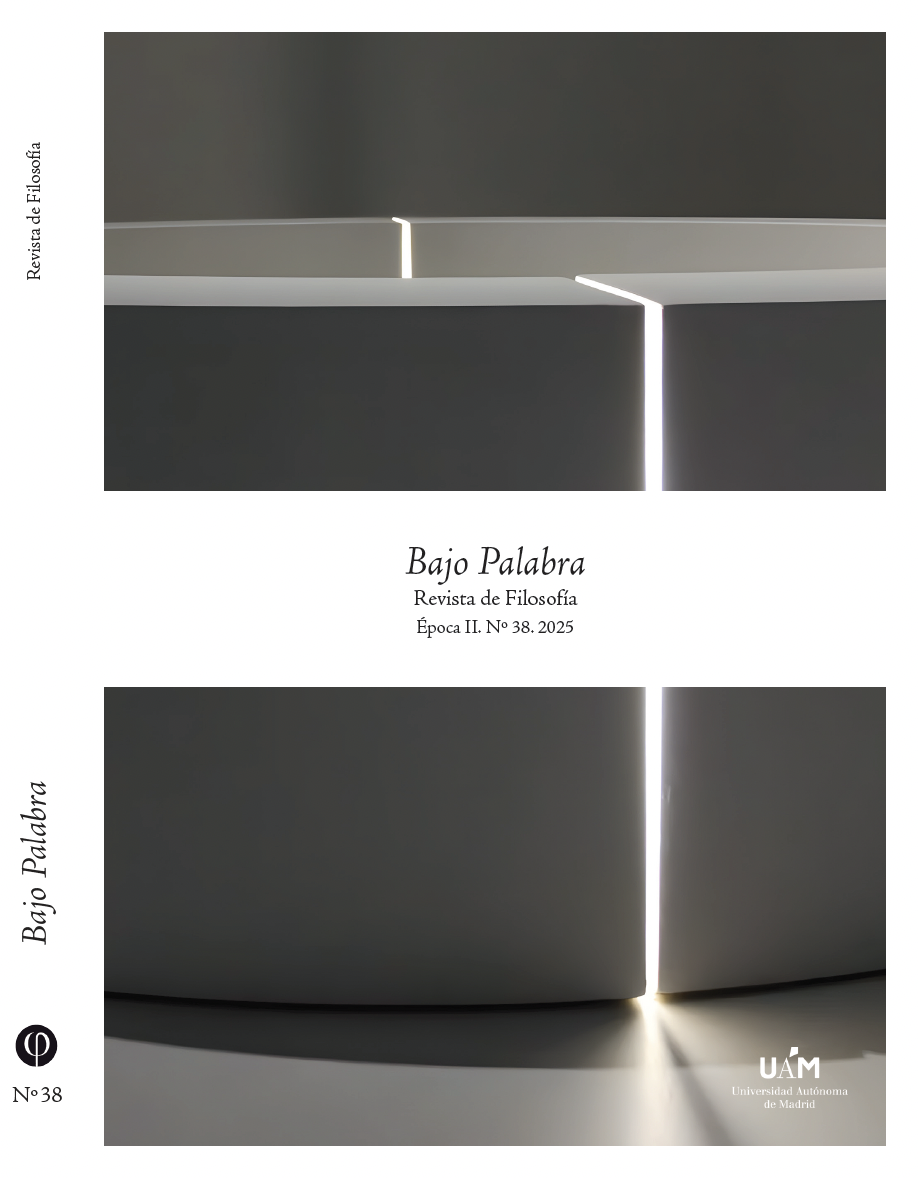Palabras clave:
Contagio mimético, naturalismo biológico, ficción, empatíaDerechos de autor 2025 Elena Yrigoyen

Esta obra está bajo una licencia internacional Creative Commons Atribución 4.0.
Resumen
El contagio mimético sigue generando miedo en las sociedades democráticas actuales, lo que provoca un rechazo a la mimesis como productora de vínculos sociales. Sin embargo, desde la perspectiva del naturalismo biológico, la mimesis se toma como un fenómeno evolutivo propio de nuestra especie y de muchas otras, lo que permite mostrar un vínculo mucho más complejo entre ella y los afectos. A partir de tales coordenadas, este artículo defiende la necesidad de entrenar nuestras habilidades miméticas para, paradójicamente, resistir mejor a los efectos de contagio o arrastre mimético y ensanchar los horizontes de vinculación social.
Descargas
Citas
Byrne, R. and Russon, A., “Learning by Imitation: A Hierarchical Approach”, The Behavioral and Brain Sciences, 21, n.o 5, 1998. https://doi.org/10.1017/ s0140525x98001745.
Canetti, Elias, Crowds and Power, New York, Farrar, Straus and Giroux, 1984.
Chartrand, Tanya L., and van Baaren, Rick, “Human mimicry”, Advances in experimental social psychology, Vol 41, pp. 219-74. San Diego, CA, US: Elsevier Academic Press, 2009. https://doi.org/10.1016/S0065-2601(08)00405-X.
Chartrand, Tanya L., y Amy N. Dalton, “Mimicry: Its ubiquity, importance, and functionality”, Oxford handbook of human action, New York, NY, US, Oxford University Press, 2009, pp. 458-83.
Chater, Nick & Hurley, Susan (eds.), Perspectives on Imitation, Volume 1: From Neuroscience to Social Science. Mechanisms of Imitation and Imitation in Animals, The MIT Press, 2005. https://doi.org/10.7551/mitpress/5330.001.0001.
Chico, David Perez, «¿Problema, qué problema? Naturalismo biológico y el problema Mente-Cuerpo», Teorema: International Journal of Philosophy 18, n.o 1, 1999, pp. 125-38.
Corcoran, K., “The Trouble With Searle’s Biological Naturalism”, Erkenntnis 55, 2001, pp. 307-24. https://doi.org/10.1023/A:1013386105239.
Domínguez, Asier Arias, «El embrollo causal del naturalismo biológico», Daimon. Revista Internacional de Filosofia, n.o 92, 2024, pp. 131-43. https://doi.
org/10.6018/daimon.458871.
Gadamer, Hans-Georg, Truth and Method, London, Bloomsbury Academic, 2013. Gebauer, Gunter, y Christoph Wulf, Mimesis: Culture Art Society, Berkeley, University of California Press, 1996.
Gibbs, Anna, “Panic! Affect Contagion, Mimesis and Suggestion in the Social Field”, Cultural Studies Review 14, n.o 2, 1970. https://doi.org/10.5130/csr.v14i2.2076.
Girard, René, To Double Business Bound, Johns Hopkins University Press, 1988. https://doi.org/10.56021/9780801821141.
Hatfield, Elaine, John T. Cacioppo, y Richard L. Rapson, “Emotional contagion”, Current Directions in Psychological Science, vol. 2, n.o 3, 1993, pp. 96-99. https://doi.org/10.1111/1467-8721.ep10770953.
Levy, Neil, “Paul E. Griffiths (1996), ‘The Historical Turn in the Study of Adaptation’”, British Journal for the Philosophy of Science, vol. 47, Routledge, 2010, pp. 511-32.
Nussbaum, Martha Craven, Poetic Justice: The Literary Imagination and Public Life, USA, Beacon Press, 1995.
Preston, Francesco and de Waal, Frans, “Empathy: Its Ultimate and Proximate Bases”, The Behavioral and Brain Sciences, n.º 25, 1, 2002. https://doi. org/10.1017/s0140525x02000018.
Ricoeur, Paul, Time and Narrative, Volume 1, Chicago, IL, University of Chicago Press, 1990.
Searle, John, “Biological Naturalism”, The Blackwell Companion to Consciousness, John Wiley & Sons, Ltd, 2017, pp. 327-36. https://doi. org/10.1002/9781119132363.ch23.
Searle, John R., Intentionality: An Essay in the Philosophy of Mind, Cambridge, Cambridge University Press, 1983. https://doi.org/10.1017/ CBO9781139173452.
Schaeffer, J.-M., El fin de la excepción humana, Barcelona, Marbot Editores, 2009.
Schaeffer, J.-M., Why Fiction? Nebraska, University of Nebraska Press, 2010.
Tarde, Gabriel, Les lois de l’imitation: Étude sociologique, France, Adamant, 2003.
Taussig, Michael, Mimesis and Alterity: A Particular History of the Senses, New York, Routledge, 1993.
Tomasello, Michael, The Cultural Origins of Human Cognition, Harvard, Harvard University Press, 2009.
Waal, Frans B. M. de, “Putting the Altruism Back into Altruism: The Evolution of Empathy”, Annual Review of Psychology, 59, 2008, pp. 279-300. https://doi. org/10.1146/annurev.psych.59.103006.093625.
Waal, Frans B. M. de, and Pier Francesco Ferrari, “Towards a Bottom-up Perspective on Animal and Human Cognition”, Trends in Cognitive Sciences 14, 5, 2010, pp. 201-7. https://doi.org/10.1016/j.tics.2010.03.003.

